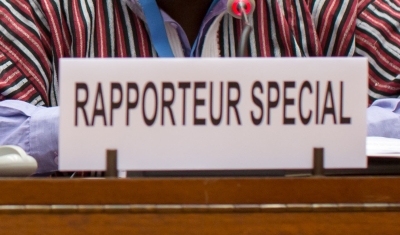AI and Human RIghts: Risks and Promises - Panel at the 2025 LATSIS Symposium
Human Rights Conversations


LATSIS Symposium
Artificial Intelligence (AI) is rapidly transforming the human rights landscape — from automated decision-making to predictive analytics and risk mapping. While AI might offer promising solutions for advancing rights protection, it also presents profound risks: automated warfare, algorithmic discrimination, surveillance risks, misuse by states and non-state actors and accountability gaps.
This panel brings together practitioners and researchers from the fields of AI ethics, international human rights law, conflict and war studies as well as digital innovation to dissect the duality of AI’s role in this space. It will explore how AI is being used by human rights institutions to enhance the efficiency, scope, and impact of monitoring and implementation frameworks — and how academic research contributes by critically reflecting on these developments and interrogating their broader implications. The panel will also examine how AI can entrench structural discrimination, amplify asymmetries of power, or be used for mass-surveillance and the automation of warfare.
This Human Rights Conversation, the first event of this dedicated Series to be taking place outside of Geneva, is co-organized with the Centre for Security Studies at ETH Zurich (CSS) and is an integrating part of the 2025 Latsis Symposium: Science for Global Development and Humanitarian Action, an initiative of ETH for Development (ETH4D).
Guiding questions
- In what ways is AI already being used to promote or undermine human rights?
- How can systemic risks in AI-driven solutions, such as surveillance, bias and opacity, be identified and addressed?
- Where are the ethical boundaries of AI deployment in rights-sensitive and high-risk contexts?
- How can we ensure inclusive, accountable, and transparent governance of AI systems in global human rights work, including where such systems intersect with security and conflict-related domains??
- How can interdisciplinary collaboration - especially between human rights practitioners, experts in conflict studies and AI researchers - be fostered and sustained?
Opening Remarks
- Felix Kirchmeier, Executive Director, Geneva Human Rights Platform, Geneva Academy of International Humanitarian Law
Moderator
- Myriam Dunn Cavelty, Senior Scientist and Deputy for Research and Teaching at the Center for Security Studies (CSS), ETH Zurich
List of panelists
- Kebene Wodajo, Lecturer at the Department of Humanities, Social and Political Sciences, ETH Zurich
- Isabel Ebert, Human Rights Officer, B-Tech Project, UN Human Rights Office
- Salva Lacruz, Programme Manager, Huridocs
- Jessica Dorsey, Assistant Professor of International Law, Utrecht University School of Law and Director, Realities of Algorithmic Warfare
Closing Remarks
- Domenico Zipoli, Project Coordinator and Senior Research Fellow, Geneva Human Rights Platform, Geneva Academy of International Humanitarian Law















